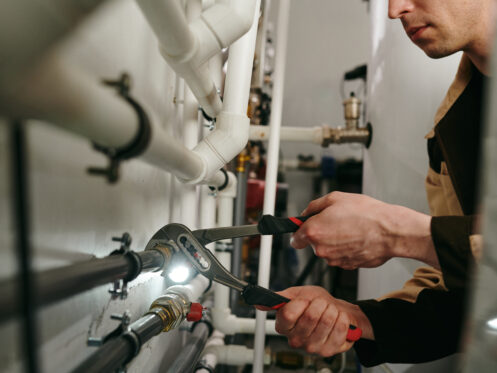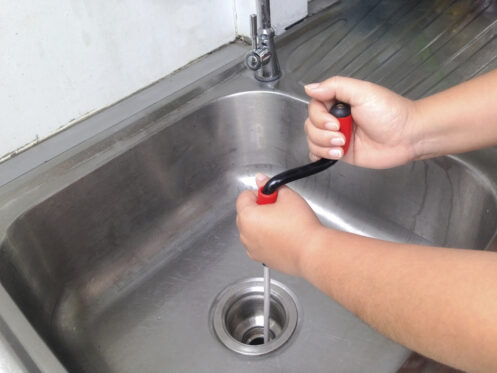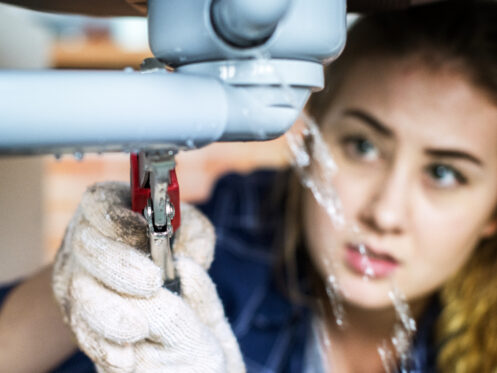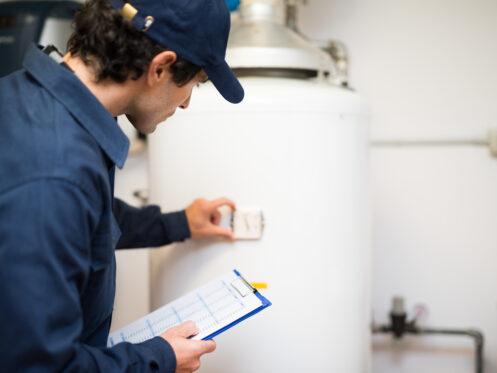Attempting to perform DIY plumbing repairs comes with several drawbacks. For starters, DIYers usually lack the knowledge and skills that it takes to perform effective plumbing repairs. This can make plumbing problems much worse, leading to water damage in the home and certain health risks. Furthermore, DIY repairs can void warranties and insurance coverage, leaving you liable for the resulting damages. Hiring a plumber is the best way to avoid these problems.
1. Leaky Pipes
There are many reasons why a pipe leaks. Corrosion gradually weakens pipe materials, leading to cracks and holes. High water pressure stresses pipes, causing them to develop leaks over time. Temperature changes expand and contract pipes, leading to joint loosening and leaks. Physical damage from accidents or improper installation can also cause leaks. Usually, repairing pipe leaks requires the expertise of a professional plumber due to the complexity of plumbing systems and the need for specialized tools and materials. Plumbers know how to diagnose the cause of leaks accurately and employ repair techniques to ensure lasting solutions. This expertise is crucial to minimizing the risk of further damage and water waste.
2. Clogged Pipes
Over time, debris, grease, mineral deposits and foreign objects accumulate inside pipes, restricting water flow and causing blockages. Tree roots can also infiltrate underground pipes, leading to stubborn clogs. Clearing pipe clogs requires specialized tools and techniques. Plumbers can effectively identify the location and cause of the clog using diagnostic equipment, such as cameras. Plumbers employ effective solutions, such as hydro-jetting or snaking, to remove the obstruction safely and thoroughly. Clearing the clogs is essential to preventing further damage and restoring proper drainage in the plumbing system.
3. Frozen Pipes
Even though Florida isn’t well known for freezing temperatures, they do sometimes occur. When freezing water sits inside a pipe, it expands. The more it extends, the more pressure it exerts on the pipe walls, potentially causing it to burst. Repairing frozen pipes requires the expertise of a professional plumber with the tools and knowledge to thaw frozen pipes and prevent further damage safely. Plus, they can inspect the plumbing system for vulnerabilities and recommend preventive measures to protect pipes from freezing in the future.
4. Pipe Corrosion
Pipe corrosion can occur due to various factors, such as age, water quality and chemical reactions. Common causes include exposure to acidic or alkaline water, high levels of dissolved oxygen or electrolysis from nearby electrical currents. Corrosion weakens pipe walls, leading to leaks, bursts and water contamination.
5. Tree Root Intrusion
Tree roots infiltrate pipes through small cracks or joints, seeking moisture and nutrients. As the roots grow, they exert pressure on the pipe walls, causing cracks and leaks. In some cases, they will completely break the pipes. Plumbers use various methods to fix this issue, such as hydro jetting to clear roots from the pipes. If the damage is extensive, they may also use trenchless pipelining to repair cracks without excavation or pipe replacement. Additionally, plumbers may recommend root barriers or periodic root pruning to prevent future intrusion.
6. Low Water Pressure
There are lots of things that can lead to low water pressure in a home, like mineral buildup or pipe leaks. It’s also possible that the home has a poor connection to the local water supply. A plumber can diagnose the underlying cause and implement the right solution. Pipe descaling, leak repairs, pipe replacement due to corrosion and pressure-boosting devices, including water pressure regulators and booster pumps, are all options available to plumbers.
7. Noisy Pipes
Noisy pipes are annoying and a sign of a bigger issue. When water pressure suddenly drops, it can cause pipes to shake and make a thumping sound, a phenomenon known as water hammering. Rattling or ticking sounds may indicate loose pipes, while a rumbling noise often suggests sediment accumulation in the water heater. A plumber can help by assessing the cause of the noise and implementing solutions like installing water hammer arrestors, securing loose pipes or flushing out sediment. Their expertise ensures quieter plumbing systems and prevents potential damage from noisy pipes.
8. Pipe Bellies
Pipe bellies refer to sections of pipes that sag or develop a low spot due to improper installation, soil erosion or settling of the foundation. These bellies can trap water, leading to clogs, backups and eventual pipe damage. A plumber will diagnose pipe bellies using specialized equipment like video cameras to inspect the pipe’s interior. They may recommend trenchless repair methods like pipe relining to correct the sagging portion without extensive excavation. By addressing pipe bellies promptly, plumbers prevent further damage and restore proper water flow within the plumbing system.
9. Sewer Line Backup
A backup in the sewer line is never a good thing. These backups usually occur as a result of tree root intrusions, grease accumulation or obstructions caused by foreign objects. The backups can lead to foul odors, sluggish drainage and sewage backups inside the home. Plumbers utilize diverse methods, like video inspections, to pinpoint the underlying cause and hydro jetting to dislodge blockages. They may also suggest installing backflow prevention devices to minimize the likelihood of future backups.
10. Slab Leaks
When water seeps into a building’s concrete slab, we call it a slab leak. Common causes include corrosion of pipes due to age, shifting soil, poor installation or abrasion from nearby rocks. These leaks can lead to water damage and mold growth and compromise the structural integrity of your home. Plumbers use leak detection devices and video inspection cameras to locate and assess slab leaks. Repair methods vary depending on the severity and location of the leak but may involve pipe replacement, epoxy lining or rerouting pipes. Prompt detection and repair by a plumber are essential to prevent further damage to the building’s foundation and infrastructure.
11. Sewer Gas Odor
Sewer gas odors usually stem from dried-out drain traps, damaged sewer lines or blocked vent pipes. These issues allow sewer gases to escape into living spaces, posing health risks and unpleasant odors. Plumbers can address these issues by inspecting and repairing drain traps, conducting smoke tests to locate leaks in sewer lines and clearing blockages in vent pipes. Additionally, they may recommend installing vent caps or filters to prevent sewer gas from entering the home.
12. Lead and Polybutylene Pipe Concerns
Lead pipes were once commonly used for plumbing but are now known for their health risks, including lead contamination of drinking water. Polybutylene pipes, while inexpensive, are prone to deterioration and failure over time, leading to leaks and water damage. Plumbers can assist by inspecting lead or polybutylene pipes and recommending replacement with safer materials like copper or PEX. They can also address any leaks, corrosion or deterioration associated with these pipe materials.
When you need help with your home’s plumbing, Buehler Air Conditioning & Plumbing is the place to call. We also help Jacksonville, FL, homeowners with HVAC repairs, air scrubbers, air duct cleaning, HVAC zoning and so much more. Contact us today to schedule a pipe repair for your home.




